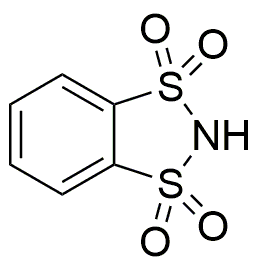1,2-Benzenedisulfonic imide is widely utilized in research focused on:
- Organic Synthesis: This compound serves as a versatile reagent in organic chemistry, facilitating the synthesis of complex molecules and functional groups, which is essential for developing new pharmaceuticals.
- Polymer Chemistry: It is employed in the production of specialty polymers, enhancing material properties such as thermal stability and chemical resistance, making it valuable in industries like automotive and electronics.
- Analytical Chemistry: The compound is used as a derivatizing agent in chromatography, improving the detection and quantification of various analytes, which is crucial for quality control in food and drug industries.
- Environmental Applications: It plays a role in wastewater treatment processes, helping to remove harmful pollutants through advanced oxidation processes, thereby contributing to environmental sustainability.
- Research and Development: The compound is significant in developing new materials and technologies, particularly in the fields of nanotechnology and catalysis, where innovative solutions are needed for energy efficiency and sustainability.
General Information
Properties
Safety and Regulations
Applications
1,2-Benzenedisulfonic imide is widely utilized in research focused on:
- Organic Synthesis: This compound serves as a versatile reagent in organic chemistry, facilitating the synthesis of complex molecules and functional groups, which is essential for developing new pharmaceuticals.
- Polymer Chemistry: It is employed in the production of specialty polymers, enhancing material properties such as thermal stability and chemical resistance, making it valuable in industries like automotive and electronics.
- Analytical Chemistry: The compound is used as a derivatizing agent in chromatography, improving the detection and quantification of various analytes, which is crucial for quality control in food and drug industries.
- Environmental Applications: It plays a role in wastewater treatment processes, helping to remove harmful pollutants through advanced oxidation processes, thereby contributing to environmental sustainability.
- Research and Development: The compound is significant in developing new materials and technologies, particularly in the fields of nanotechnology and catalysis, where innovative solutions are needed for energy efficiency and sustainability.
Documents
Safety Data Sheets (SDS)
The SDS provides comprehensive safety information on handling, storage, and disposal of the product.
Product Specification (PS)
The PS provides a comprehensive breakdown of the product’s properties, including chemical composition, physical state, purity, and storage requirements. It also details acceptable quality ranges and the product's intended applications.
Certificates of Analysis (COA)
Search for Certificates of Analysis (COA) by entering the products Lot Number. Lot and Batch Numbers can be found on a product’s label following the words ‘Lot’ or ‘Batch’.
Numéro de catalogue
Numéro de lot/série
Certificates Of Origin (COO)
This COO confirms the country where the product was manufactured, and also details the materials and components used in it and whether it is derived from natural, synthetic, or other specific sources. This certificate may be required for customs, trade, and regulatory compliance.
Numéro de catalogue
Numéro de lot/série
Safety Data Sheets (SDS)
The SDS provides comprehensive safety information on handling, storage, and disposal of the product.
DownloadProduct Specification (PS)
The PS provides a comprehensive breakdown of the product’s properties, including chemical composition, physical state, purity, and storage requirements. It also details acceptable quality ranges and the product's intended applications.
DownloadCertificates of Analysis (COA)
Search for Certificates of Analysis (COA) by entering the products Lot Number. Lot and Batch Numbers can be found on a product’s label following the words ‘Lot’ or ‘Batch’.
Numéro de catalogue
Numéro de lot/série
Certificates Of Origin (COO)
This COO confirms the country where the product was manufactured, and also details the materials and components used in it and whether it is derived from natural, synthetic, or other specific sources. This certificate may be required for customs, trade, and regulatory compliance.


